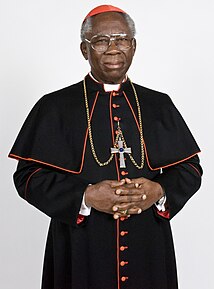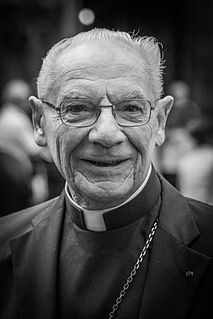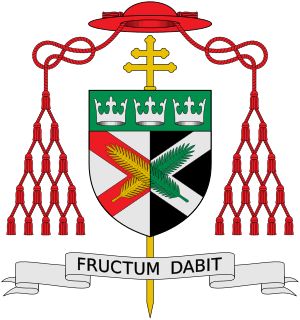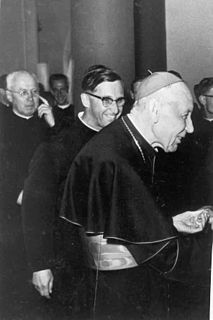
Pope Paul VI was head of the Catholic Church and sovereign of the Vatican City State from 21 June 1963 to his death in 1978. Succeeding John XXIII, he continued the Second Vatican Council, which he closed in 1965, implementing its numerous reforms, and fostered improved ecumenical relations with Eastern Orthodox and Protestant churches, which resulted in many historic meetings and agreements.
The Roman Curia comprises the administrative institutions of the Holy See and the central body through which the affairs of the Catholic Church are conducted. It acts in the pope's name and with his authority for the good and for the service of the particular churches and provides the central organization for the church to advance its objectives.

Franz König was an Austrian Cardinal of the Catholic Church. He served as archbishop of Vienna from 1956 to 1985, and was elevated to the cardinalate in 1958. The last surviving cardinal elevated by Pope John XXIII, he was the second-oldest and longest-serving cardinal worldwide at the time of his death.
A dicastery is a department of the Roman Curia, the administration of the Holy See through which the pope directs the Roman Catholic Church. The most recent comprehensive constitution of the church, Pastor bonus (1988), includes this definition:
By the word "dicasteries" are understood the Secretariat of State, Congregations, Tribunals, Councils and Offices, namely, the Apostolic Camera, the Administration of the Patrimony of the Apostolic See and the Prefecture for the Economic Affairs of the Holy See.

Francis Arinze is a Nigerian Cardinal of the Roman Catholic Church. He was Prefect of the Congregation for Divine Worship and the Discipline of the Sacraments from 2002 to 2008. He has been the Cardinal Bishop of Velletri-Segni since 2005. Arinze was one of the principal advisors to Pope John Paul II and was considered papabile before the 2005 papal conclave, which elected Pope Benedict XVI.

Justin Francis Rigali is an American cardinal of the Roman Catholic Church. He was the eighth Archbishop of Philadelphia, having previously served as Archbishop of St. Louis from 1994 to 2003. Rigali was elevated to the cardinalate in 2003.

Crescenzio Sepe is an Italian prelate of the Catholic Church who has been Archbishop of Naples since 2006. He served in the Roman Curia as Prefect of the Congregation for the Evangelization of Peoples from 2001 to 2006. He was made a cardinal in 2001. Before that he spent 25 years in increasingly important positions in the Roman Curia.
The Pontifical Council for Interreligious Dialogue (PCID) is a dicastery of the Roman Curia, erected by Pope Paul VI on 19 May 1964 as the Secretariat for Non-Christians, and renamed by Pope John Paul II on 28 June 1988.

Paul Joseph Jean Poupard is a French prelate of the Catholic Church who has been a Cardinal since 1985. He held positions in the Roman Curia for more than 25 years, serving as President of the Pontifical Council for Culture from 1988 to 2007 and briefly as President of the Pontifical Council for Interreligious Dialogue.

Jean-Louis Pierre Tauran was a French cardinal of the Catholic Church. When he died, he had been the president of the Pontifical Council for Interreligious Dialogue since 2007 and Camerlengo of the Holy Roman Church since the end of 2014. He was made a cardinal in 2003 and was the Cardinal Protodeacon from 2011 to 2014. His earlier career included almost thirty years in the diplomatic service of the Holy See and several years as the Vatican's chief archivist and librarian.

Franc Rode is a Slovenian Cardinal of the Roman Catholic Church. He is the prefect emeritus of the Congregation for Institutes of Consecrated Life and Societies of Apostolic Life, having served as prefect from 2004 to 2011. He was elevated to the cardinalate in 2006.

Michael Louis Fitzgerald is a British cardinal of the Roman Catholic Church and an expert on Christian–Muslim relations. He has had the rank of archbishop since 2002. At his retirement in 2012, he was the papal nuncio to Egypt and delegate to the Arab League. He headed the Pontifical Council for Interreligious Dialogue from 2002 to 2006. Pope Francis raised him to the rank of cardinal on 5 October 2019.

Leonardo Sandri is an Argentine Cardinal of the Catholic Church. He has been the Prefect of the Congregation for the Oriental Churches since June 2007 and a cardinal since November of that year. He served in the diplomatic service of the Holy See from 1974 to 1991, in several overseas assignments including as permanent observer of the Holy See before the Organization of American States from 1989 to 1991, and in Rome as Substitute for General Affairs in the Secretariat of State from 1999 to 2007. On 24 January 2020, Pope Francis approved his election as Vice Dean of the College of Cardinals.

The Pontifical Council for Culture is a dicastery of the Roman Curia charged with fostering the relationship of the Catholic Church with different cultures. Pope John Paul II founded it on 20 May 1982. He later merged the Pontifical Council for Dialogue with Non-Believers with it.
A pontifical council is a mid-sized department or dicastery of the Roman Curia, the central organization responsible for assisting the pope in the governance and oversight of Catholic Church. Such a council has a cardinal or archbishop as its president and is restricted in its activities in comparison with the larger parts of the Curia.

Augustin Bea, S.J., was a German Jesuit priest and scholar at the Pontifical Gregorian University specialising in biblical studies and biblical archeology. He also served as the personal confessor of Pope Pius XII.

Gianfranco Ravasi is an Italian prelate of the Catholic Church. A cardinal since 2010, he has been President of the Pontifical Council for Culture since 3 September 2007. He headed Milan's Ambrosian Library from 1989 to 2007.
Pope Paul VI's reform of the Roman Curia was accomplished through a series of decrees beginning in 1964, principally through the apostolic constitution Regimini Ecclesiae universae issued on 15 August 1967.
The Pontifical Council for Promoting Christian Unity (PCPCU) is a pontifical council whose origins are associated with the Second Vatican Council which met intermittently from 1962 to 1965.
The Council of Cardinals (C9), also known as the Council of Cardinal Advisers, is a group of cardinals of the Catholic Church appointed by Pope Francis to serve as his advisers. Announced on 13 April 2013, one month after his election, it was formally established on 28 September of the same year. The council currently has seven members, following the decision by Pope Francis to remove three of its members in late 2018 and the appointment of another in 2020.













